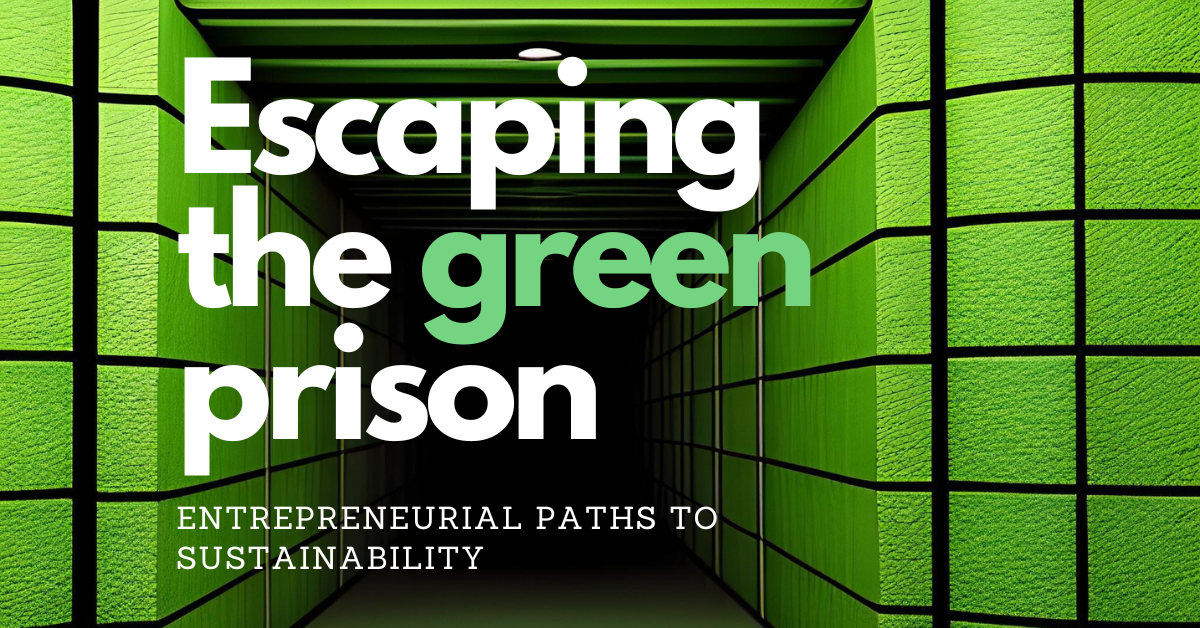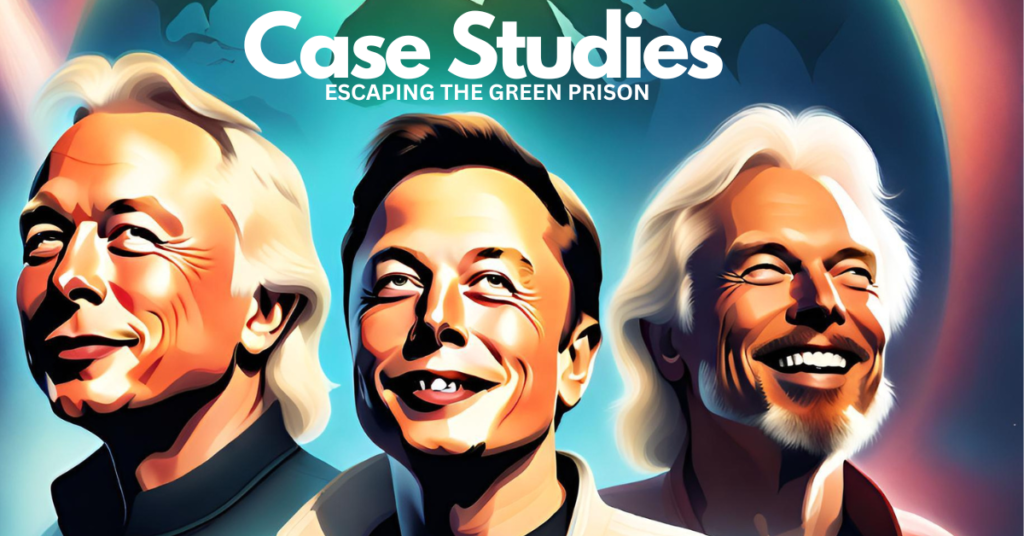
Escaping the Green Prison: Entrepreneurial Paths to Sustainability
In a world where climate change, resource depletion, and social inequality are looming threats, it’s no longer business as usual for some responsible entrepreneurs. The old paradigms of profit maximization at any cost are increasingly unsustainable, both ethically and economically. This article explores the concept of the “Green Prison” and provides insights into how entrepreneurs can break free from unsustainable behavior to build businesses that are not only profitable but also socially and environmentally responsible.
Understanding the Green Prison
The term “the green prison” refers to a situation in which entrepreneurs, despite their interest in adopting sustainable business practices, find themselves facing a dilemma. This dilemma arises because, in certain conditions, the competitive dynamics of markets discourage or even penalize entrepreneurs for investing in sustainability. While sustainable actions can benefit society as a whole, these actions often come with higher costs for individual entrepreneurs. These costs are not shared by their competitors, giving those competitors a competitive advantage. As a result, entrepreneurs may be reluctant to pursue sustainability, even if they genuinely wish to contribute to sustainable development.
This paradox leads to sustainable actions being discouraged rather than rewarded, highlighting the need to reevaluate incentive structures and competitive dynamics to better align entrepreneurship with the goals of sustainable development.
In our journey to break free from the “Green Prison” it’s crucial to acknowledge and address the challenges and barriers that often hinder sustainable entrepreneurship. In this section, we will delve into the various obstacles that aspiring environmentally and socially responsible entrepreneurs encounter on their path to creating businesses that benefit both the planet and society. By understanding these challenges, we can better equip ourselves to navigate through them and pave the way for a more sustainable and responsible future.
The challenges and barriers to sustainable entrepreneurship
In the ever-evolving landscape of entrepreneurship, sustainable entrepreneurs emerge as a distinct and visionary force, driven by a mission that transcends the pursuit of mere profits. Their commitment extends to addressing the often-overlooked issues of society and the environment. As we delve into the unique challenges faced by these resilient individuals, we draw inspiration and insights from the enlightening research presented in the article titled “Sustainable Entrepreneurship: The Role of Perceived Barriers and Risk” authored by Brigitte Hoogendoorn, Peter van der Zwan, and Roy Thurik.
In this exploration, we will uncover the distinctive hurdles that sustainable entrepreneurs encounter as they endeavor to make a meaningful impact:
Market Imperfections
Sustainable entrepreneurs often find themselves in markets that are far from perfect. These imperfections manifest as issues such as public goods, externalities, monopolies, government interventions, and information gaps. For instance, when tackling environmental challenges, they may grapple with unclear property rights, the absence of pricing mechanisms for vital natural resources, and concerns about resource sustainability. In contrast, traditional entrepreneurs typically operate within markets with well-defined property rights and clearer pricing structures. Furthermore, sustainable entrepreneurs frequently deal with public goods that are challenging to exclude others from benefiting, limiting their potential for profit. Similarly, when addressing social needs like providing sanitation to underserved communities, they face challenges as beneficiaries may lack the means to pay for the value created.
Initiating Institutional Change
They also often find themselves at the forefront of driving institutional changes. This entails reshaping existing rules, public policies, norms, and legislation to support their sustainability-driven initiatives. Consider clean-energy technologies as an example. Entrepreneurs in this field must overcome obstacles such as insufficient infrastructure and competition from conventional energy sources with distorted pricing due to subsidies. Similarly, sustainable farmers and agri-entrepreneurs encounter their own set of hurdles, including limited access to organic certification processes, insufficient support for regenerative farming practices, and competition from conventional agriculture bolstered by government subsidies. This necessitates active participation in the political arena to bring about institutional changes that favor sustainable solutions.
Broad Knowledge Requirements
Success in sustainable entrepreneurship hinges on possessing a diverse knowledge base. This stems from the intersection of market imperfections and the need for institutional change. Entrepreneurs in this sphere invest resources in acquiring external knowledge, fostering collaboration with a wide array of stakeholders, and cultivating internal expertise. Sustainable entrepreneurs often navigate intricate stakeholder relationships involving private entities, the public sector, and civil society. These complexities arise from the multifaceted nature of sustainability challenges and the imperative to collaborate effectively with diverse stakeholders.
Breaking Free: Entrepreneurs’ Escape from the Green Prison
In their insightful work titled ‘Escaping the green prison: Entrepreneurship and the creation opportunities for sustainable development,’ authors Desirée F. Pacheco, Thomas J. Dean, and David S. Payne uncover the formidable hurdles confronting sustainable entrepreneurs and the innovative solutions they should employ. Let’s explore a range of powerful strategies that can empower them to create a more sustainable future while thriving in the business world.
Innovative Business Models
One solution is to develop innovative business models that align profitability with sustainability. Entrepreneurs can create value by offering products or services that address environmental or social issues while also generating profits. This can involve rethinking traditional business practices to incorporate sustainable elements.
Collaborative Partnerships
Entrepreneurs can escape the “green prison” by forming collaborative partnerships with various stakeholders, including government agencies, non-profit organizations, and other businesses. These partnerships can provide access to resources, expertise, and support for sustainable initiatives.
Policy Advocacy and Institutional Change
Sustainable entrepreneurs can actively engage in advocating for policy changes and institutional reforms that support sustainability. By working with policymakers and influencing regulatory frameworks, they can create a more conducive environment for sustainable business practices.
Consumer Education and Awareness
Educating consumers about the value of sustainable products and services is crucial. Entrepreneurs can invest in marketing and communication efforts to raise awareness about the environmental and social benefits of their offerings, thereby expanding their customer base.
Access to Finance
Overcoming financial challenges is essential. Entrepreneurs can seek out investors, grants, or funding sources specifically interested in sustainable ventures. Demonstrating the potential for both social and financial returns can attract investors who share the vision of sustainability.
Technology and Innovation
Embracing technological advancements and fostering innovation is another way to escape the “green prison.” Sustainable entrepreneurs can develop or adopt new technologies that enhance the efficiency and sustainability of their products or processes.
Market Development
Expanding the market for sustainable products and services is key. Entrepreneurs can work on creating demand by emphasizing the unique selling points of sustainability, such as reduced environmental impact or social benefits.
Adaptive Management
Being flexible and adaptable is crucial when facing complex sustainability challenges. Entrepreneurs should be willing to learn from failures, adjust their strategies, and continuously improve their business models.
In essence, breaking free from the “green prison” requires a combination of innovation, collaboration, advocacy, education, and adaptability. Sustainable entrepreneurs play a vital role in driving positive change by identifying opportunities within these challenges and actively working to create a more sustainable future.
The Human Imperative in Escaping the Green Prison
As we venture further into the 21st century, the urgency of addressing environmental challenges becomes increasingly evident. Our planet’s well-being hinges on our ability to transition towards more sustainable practices and technologies. While innovation and cutting-edge solutions are critical components of escaping the “green prison,” we must not overlook the profoundly human aspects of this endeavor. Solving the complex puzzle of sustainability goes beyond technological advancements; it requires us to address human collaboration challenges and tap into the collective spirit of cooperation and empathy.
One of the key human challenges in escaping the green prison lies in fostering collaboration among diverse stakeholders. Sustainability is a multidimensional issue that spans industries, nations, and communities. Achieving meaningful progress necessitates a harmonious alignment of interests and values across a wide spectrum of individuals and organizations. This collaborative effort goes beyond the confines of any single sector or discipline, highlighting the importance of interdisciplinary cooperation. Entrepreneurs and leaders driving sustainability initiatives must actively seek out partnerships, engage in open dialogue, and bridge the gaps that may exist between various players in the sustainable ecosystem.
Moreover, the human dimension in escaping the green prison extends to the very core of our values and behaviors. Sustainability is not solely a matter of adopting greener technologies; it requires a profound shift in our lifestyles, consumption patterns, and mindset. This transformation involves fostering a deep sense of responsibility towards our planet and future generations. Entrepreneurs and leaders in sustainability must not only innovate but also inspire and educate. By championing ethical practices, fostering environmental stewardship, and cultivating a culture of mindfulness, they can create a ripple effect that extends far beyond their immediate initiatives. In essence, the human aspect of sustainability is about nurturing a collective consciousness that recognizes the interconnectedness of all life on Earth and the shared responsibility we bear in safeguarding our planet’s health and vitality.
Case Studies of Sustainable Entrepreneurs

In the dynamic realm of sustainability and environmental innovation, three extraordinary entrepreneurs have emerged as trailblazers, spearheading the quest for a more sustainable world. Firstly, let’s focus on Elon Musk, the visionary CEO behind Tesla. Musk’s groundbreaking efforts have revolutionized the automotive industry with electric vehicles that not only redefine transportation but also promote energy efficiency and a reduction in carbon emissions. His relentless pursuit of renewable energy integration sets a high standard for sustainability in the automotive sector.
Moving on, we find Yvon Chouinard, the founder of Patagonia, at the forefront of sustainable outdoor gear. Chouinard’s company is renowned for producing high-quality products while championing environmental responsibility. Patagonia’s commitment to ethical manufacturing, repair initiatives like “Worn Wear,” and advocacy for environmental causes showcases a dedication to sustainable practices that resonate far beyond the outdoor industry.
Lastly, Richard Branson, a prominent figure in sustainable entrepreneurship, deserves recognition. As the visionary behind Virgin Group, Branson has undertaken ambitious projects like Virgin Galactic and Virgin Hyperloop, aiming to make space travel and transportation more sustainable. His emphasis on reducing carbon emissions and investing in renewable energy demonstrates a commitment to shaping a greener and more sustainable future. These three entrepreneurs serve as inspirations, each in their unique way, in the global pursuit of sustainability.
Closing Thoughts
Sustainable entrepreneurs are the torchbearers of a future where business thrives while addressing pressing environmental and social issues. Throughout this exploration of their journey, we’ve uncovered significant challenges and the ingenious strategies they employ to break free from the “green prison”
While their path is marked by obstacles like market imperfections, the need for institutional change, and broad knowledge requirements, these hurdles fuel innovation. Sustainable entrepreneurs wield a diverse toolkit, from innovative business models and collaborative partnerships to policy advocacy, consumer education, and technological prowess. These tools empower them to transcend constraints and drive positive change.
In essence, sustainable entrepreneurs are catalysts for a paradigm shift, not merely a niche in the business world. They embody resilience, creativity, and a commitment to a better tomorrow. Celebrating their remarkable endeavors, we acknowledge that they hold the key to a more sustainable and prosperous future for us all.
